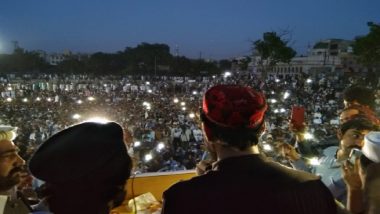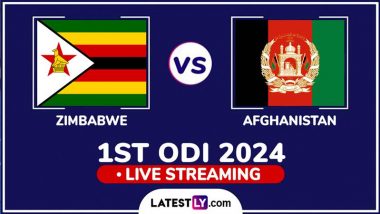Pashtuns across Pakistan are rising up against the Pakistani army establishment which has been blamed for running a shadow government and using extra-judicial killings as a policy to terrorise different populations – be it Balochis, Sindhis or Pashtuns. Thousands gathered in the city of Lahore over the weekend in support of the rapidly growing Pashtun Tahafuz (Protection) Movement (PTM) demanding basic rights for ethnic Pashtun citizens and others.
Pak flags held high by many at the rally. Anti-state? #PashtunLongMarch2Lahore pic.twitter.com/2KtoWeBrAs
— Benazir Shah (@Benazir_Shah) April 22, 2018
The movement started by young activist Manzoor Pashteen, began as a result of the killing of the 27-year-old Naqeebullah Masood, who was killed by Pakistani police in the southern city of Karachi on January 20. The authorities claimed Masood had links with militants, a charge his family and civil society activists deny. Rights groups say that thousands of Pashtun youths have been murdered or abducted by security agencies in the past decades on unproven terrorism charges. The Pashtuns, who are in a majority in Pakistan's northern parts and most of Afghanistan have paid a heavy price for a conflict that was thrust on them from the outside – the Soviet invasion followed by Taliban rule which resulted in the U.S. invasion that has resulted in thousands of deaths, directly through war or by being accused of working for one side of the conflict i.e. Taliban, Aghan government, Pakistan and hence being killed off. The atrocities inflicted on the Pashtuns ring similar to the fate of Balochis in East Pakistan.
The PTM movement is calling for an end to enforced disappearances and extra-judicial killings of which the Pakistani army and police have been reprimanded by the UN way back in 2012. The UN Working Group on Enforced and Involuntary Disappearances, noted that there is “a climate of impunity in Pakistan with regard to enforced disappearances, and the authorities are not sufficiently dedicated to investigate cases of enforced disappearance and hold the perpetrators accountable.” Human Rights groups say that thousands of Pashtun youths have been murdered or abducted by security agencies in the past decades on unproven terrorism charges. State authorities use the pretext of war on terrorism to persecute Pashtuns, they say. Over the years, Pashtuns have been branded as Islamists, or militants, due to the fact that the Taliban are also a Pashtun-dominated outfit, and because the radicalism in the country's northern areas has spiked over the years as a result of decades-long wars.
The slogans heard at the PTM protests are, "The uniforms are behind the terrorists," and "We have to identify the place that destroyed us…It is GHQ (referring to Pakistan’s Military Headquarters in Rawalpindi)!"An AFP reporter spoke to a protester at the Lahore rally: "We do not accept the Pakistan that is for the generals and the mullahs, we want a Pakistan for the Sindhis, for the Baloch, for the Pashtun and for the working class of Punjab," said PTM supporter Fanoos Gujar, referring to the country's major ethnic groups.
OP-ED: https://t.co/BEKjvhOkxD#PashtunLongMarch2Lahore #PashtunLongMarch #ManzoorPashteen #ManzoorPashtun #MalalaYousafzai #Opinion #OpEd #Newsonepk
— Newsonepk (@newsonepk) April 22, 2018
The movement has received support from Afghanistan’s president Ashraf Ghani who shared several tweets about the "Pashtun march" in February, hoping that it would succeed in "uprooting and eradicating terrorism from the region." "I fully support the historical Pashtun Long March in Pakistan. The main purpose of which is to mobilize citizen against fundamentalism and terrorism in the region," Ghani said on Twitter.
The PTM from its stronghold in Khyber-Pakhtunkhwa province is spreading to various parts of the country which have a sizeable Pashtun population. The audaciousness of the movement in calling out Pakistan’s omniscient military establishment has resulted in Rawalpindi trying to ensure the popularity of protests does not spread. After almost four months of protests, Chief of the Army Staff Gen Qamar Javed Bajwa gave a cryptic reference to the PTM on Thursday 12th April 2018, “Engineered protests would not be allowed to reverse the gains of counter terrorism operations and cautioned the nation against forgetting sacrifices of real heroes”.
General Bajwa did not name the social movement for the rights of Pashtun people, Pakhtun Tahaffuz Movement (PTM), but it was abundantly clear from his remarks that he was referring to their protests.
That the military controls Pakistan’s mainstream media is no secret. Hence the movement has received no coverage despite thousands congregating for the march. For the march in Lahore, protesters managed to circumvent the apparent media blackout by posting live video streams on social media platforms such as Twitter and Facebook. On Twitter, the hashtag #PashtunLongMarch2Lahore topped Pakistan's countrywide trends on Sunday.
This discussion on PTM for example. JI has since long argued what the state has done in the name of anti terrorist ops in the north has alienated people and will pose serious threat to the country. Now everyone's discussing the samehttps://t.co/vmMiuugMfn
— Khansaab (@GumbyAKhan) April 22, 2018
But, as with the Balochi movement which has been delegitimized using the India influence bogey, so is the fear with PTM as Pashtuns in Pakistan and across the Durand line in Afghanistan unite, in calling for an end to Pakistani Army’s high-handedness against their population.
(The above story first appeared on LatestLY on Apr 23, 2018 05:03 AM IST. For more news and updates on politics, world, sports, entertainment and lifestyle, log on to our website latestly.com).













 Quickly
Quickly




















